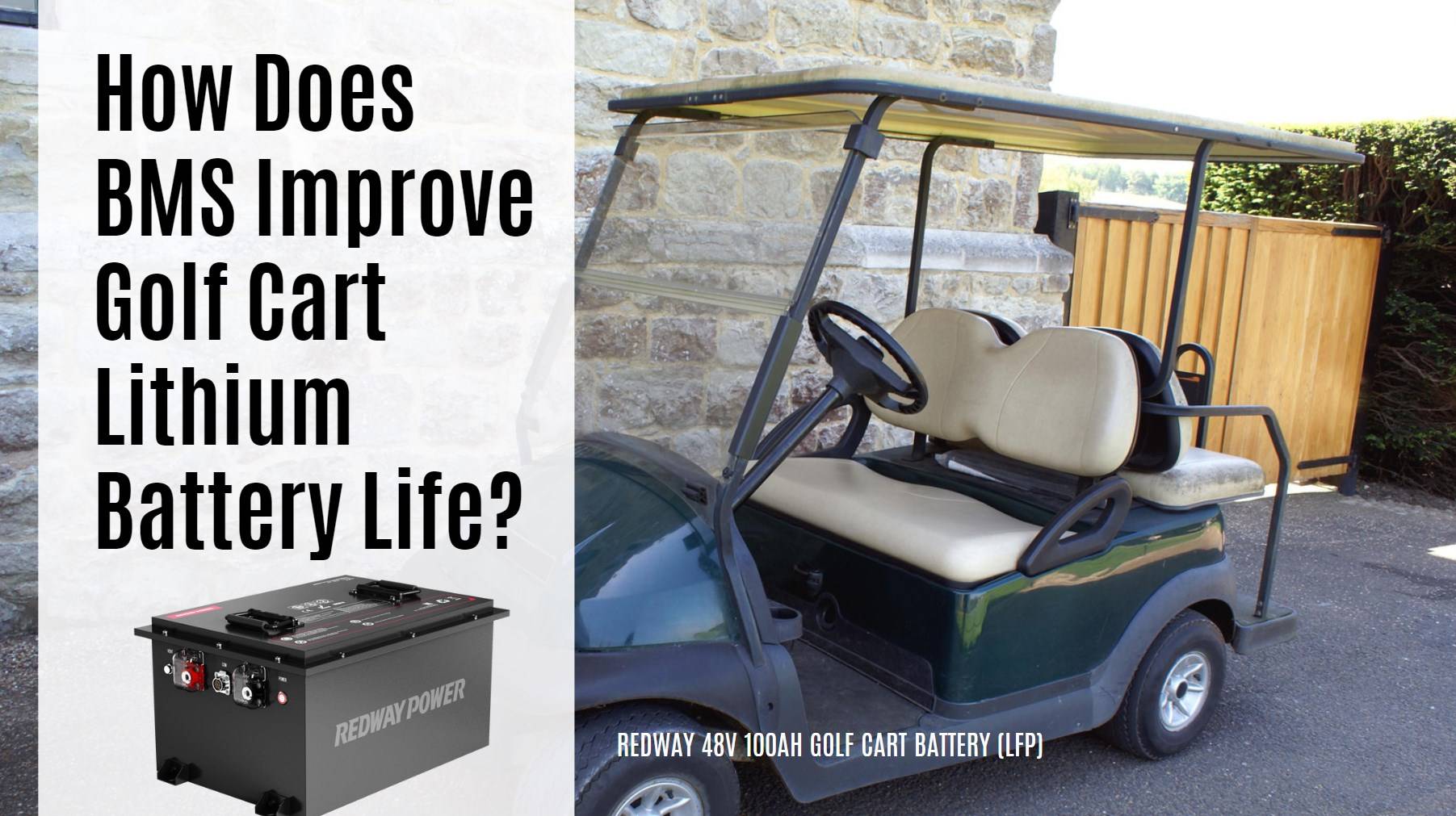
Blog
How Does a Battery Management System (BMS) Improve Golf Cart Lithium Battery Life?

A Battery Management System (BMS) plays a crucial role in enhancing the lifespan and performance of lithium batteries used in golf carts. By monitoring battery health, preventing overcharging, and managing temperature, a BMS ensures that your battery operates efficiently and safely. This article explores how a BMS contributes to the longevity of lithium batteries in golf carts.
What Is a Battery Management System (BMS) and Its Purpose?
A BMS is an electronic unit managing rechargeable batteries. It monitors voltage, current, and temperature, ensuring safe and efficient operation. It protects the battery, optimizes performance, and extends its lifespan.
A Battery Management System (BMS) is an electronic system that manages and protects battery packs. Its primary purposes include:
- Monitoring: Continuously tracks voltage, current, and temperature of each cell within the battery pack.
- Balancing: Ensures all cells charge and discharge evenly, preventing any single cell from becoming overcharged or overly discharged.
- Protection: Safeguards against conditions that could lead to battery failure, such as overvoltage, undervoltage, and excessive heat.
Chart: Functions of a BMS
| Function | Description |
|---|---|
| Monitoring | Tracks voltage, current, temperature |
| Balancing | Equalizes charge across cells |
| Protection | Prevents overcharging and overheating |
How Does a BMS Improve the Lifespan of Lithium Batteries?
A BMS extends battery lifespan by preventing overcharging and over-discharging. It balances cell charge for uniform use. By preventing damage, a BMS can increase battery life.
A well-designed BMS can significantly enhance the lifespan of lithium batteries by:
- Preventing Overcharging: By monitoring voltage levels, the BMS can disconnect the battery from the charger when it reaches full capacity, avoiding damage from overcharging.
- Avoiding Deep Discharges: The system prevents discharging below safe levels, which can lead to reduced capacity and lifespan.
- Cell Balancing: Ensures that all cells within the battery pack maintain similar charge levels, which helps maximize overall capacity and efficiency.
Chart: Lifespan Improvement Factors
| Factor | Impact on Lifespan |
|---|---|
| Overcharging Prevention | Reduces risk of damage |
| Deep Discharge Avoidance | Maintains capacity |
| Cell Balancing | Maximizes efficiency |
What Key Features Should You Look for in a BMS?
Look for cell monitoring (voltage, current, temperature), state of charge estimation, cell balancing, overcharge/discharge protection, and temperature management. Communication abilities are helpful.
When selecting a BMS for lithium batteries, consider these key features:
- Voltage Monitoring: Ability to monitor individual cell voltages to prevent imbalances.
- Temperature Sensors: Integrated sensors to monitor temperature and prevent overheating.
- Communication Protocols: Support for communication with other devices or systems for real-time monitoring.
- User Interface: A clear display or app integration for easy monitoring of battery status.
Chart: Essential Features Overview
| Feature | Importance |
|---|---|
| Voltage Monitoring | Prevents cell imbalance |
| Temperature Sensors | Protects against overheating |
| Communication Protocols | Enables real-time data access |
| User Interface | Facilitates easy monitoring |
Why Is Thermal Management Crucial for Battery Health?
Batteries perform best between 20-30°C. High temperatures cause faster degradation. Low temperatures reduce power flow. A BMS regulates temperature for safety and longevity.
Thermal management is vital because lithium batteries are sensitive to temperature changes:
- Heat Generation: Charging and discharging generate heat; excessive heat can lead to thermal runaway, damaging the battery.
- Performance Impact: High temperatures can reduce efficiency and capacity, while low temperatures can impair performance.
- BMS Role: A good BMS will include thermal management features that monitor temperature and adjust charging/discharging rates accordingly.
Chart: Temperature Impact on Performance
| Temperature Range | Effect on Performance |
|---|---|
| Below 0°C | Reduced capacity |
| 0°C – 20°C | Normal performance |
| Above 40°C | Risk of thermal runaway |
How Does a BMS Enhance Safety During Operation?
A BMS enhances safety by preventing overcharging, over-discharging, and overheating. It monitors battery health and triggers alerts. This minimizes the risk of fires or explosions.
Safety is paramount when using lithium batteries, and a BMS enhances safety through:
- Overcurrent Protection: Prevents excessive current flow that could lead to overheating or fires.
- Short Circuit Protection: Detects short circuits quickly and disconnects power to prevent damage or hazards.
- Alerts and Notifications: Provides alerts for abnormal conditions such as high temperatures or low voltages.
Chart: Safety Features Overview
| Safety Feature | Description |
|---|---|
| Overcurrent Protection | Prevents excessive current flow |
| Short Circuit Protection | Disconnects power quickly |
| Alerts | Notifies users of issues |
Industrial News
The demand for advanced battery management systems (BMS) is increasing as more consumers adopt lithium-ion technology in recreational vehicles like golf carts. Recent innovations focus on enhancing safety features while improving overall performance metrics. As sustainability becomes increasingly important in energy solutions, manufacturers are prioritizing high-quality lithium solutions equipped with sophisticated management systems.
Expert Insight
“A robust Battery Management System is critical for maximizing both safety and lifespan in lithium batteries,” states an industry expert. “By incorporating advanced monitoring and protection features, users can significantly enhance their experience while mitigating risks.” This perspective highlights the importance of choosing the right BMS when investing in lithium technology.
Know more at Top 8 Best Lithium Golf Cart Batteries in 2024
FAQ Section
How does a BMS extend battery life?
A BMS extends battery life by preventing overcharging, avoiding deep discharges, and ensuring balanced charging across all cells.
Can I add a BMS to my existing lithium battery setup?
Yes, you can integrate a compatible BMS into your existing lithium battery system for enhanced management and safety.
What happens if my battery overheats despite having a BMS?
While a good BMS provides protection against overheating, extreme conditions or malfunctions can still pose risks; regular monitoring is essential.





